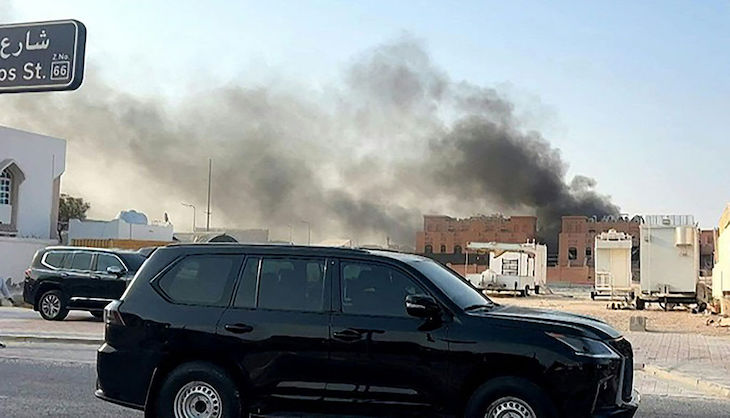‘We are ready to accept a deal (with Hamas) that would end this war, based on the cabinet decision,’ Israeli foreign minister Gideon Sa’ar said this morning. Yet whatever diplomatic momentum existed evaporated into thin air hours later. In an unprecedented Israeli operation in Qatar, Israel targeted the very Hamas officials they were supposed to be negotiating with. In the blink of an eye, smoke was rising from a building in the Qatari capital, Doha. Hamas’s chief negotiator, Khalil al-Hayya, was targeted in the attack. Israel said the raid was in response to this week’s Jerusalem bus attack and the atrocities of October 7.
Israel said the raid was in response to this week’s Jerusalem bus attack and the atrocities of October 7
The Qataris are livid; Israeli prime minister Benjamin Netanyahu not only made a mockery of the diplomatic process but ordered what could arguably be called a hostile act against a country in the Middle East whose diplomatic services are in high demand.
‘While the State of Qatar strongly condemns this assault, it confirms that it will not tolerate this reckless Israeli behaviour and the ongoing disruption of regional security, nor any act that targets its security and sovereignty,’ Qatari government spokesman Majed al-Ansari wrote on X.
Operations like this aren’t new for Israel, of course. The Israelis are known to have some of the best intelligence assets available; the Mossad is one of the most sophisticated, capable and impressive intelligence services in the world. The list of successful tactical strikes like the one that took place in Qatar today is long, from the years-long campaign against the Black September terrorist group, the 2008 assassination of Hezbollah military official Imad Mughniyeh in Syria to the 2010 killing of Mahmoud al-Mabbouh in Dubai. The message is as clear as day: if Israel wants you dead, you will eventually be dead.
The difference between those cases and today, however, is that Israel wasn’t technically engaged in negotiations with those groups at the time.
The latest draft ceasefire to end the war in Gaza, put together in part by Steve Witkoff, US President Donald Trump’s Middle East envoy, was tabled days just a few days ago. The proposal would have compelled Hamas to release all of the remaining 50 or so hostages on the first day of a 60-day truce, mandated a gradual Israeli troop withdrawal from Gaza and establish a process whereby negotiations would continue until the two sides finally reached a permanent ceasefire. But that deal now lies in tatters, if it was a serious proposal to begin with.
If Israel’s latest hit tells us anything, it’s that Netanyahu and his government aren’t interested in a negotiated resolution to the war in Gaza. This relatively mundane observation won’t come as a surprise to anybody who has been paying attention to the conflict for the last two years, but it’s worth pointing out nonetheless. Indeed, despite the Trump administration’s sporadic attempts to mediate between Israel and Hamas – and Trump’s own boasts about solving a bitter conflict his dim-witted predecessor couldn’t – the Trump White House hasn’t been any more successful in its diplomatic endeavours than the Biden White House was. Palestinian civilians are still dying. Israeli hostages, in dreadful conditions, are cowering in Hamas’s tunnel network. A humanitarian disaster is getting worse by the day. And Israel, its international reputation at its lowest in history, is drilling further down.
Of course, a big part of this can be chalked up to the stubbornness of the combatants and their propensity to treat diplomacy as gamesmanship. Getting the two sides to agree on anything is more difficult than herding cats. The positions of Israel and Hamas remain poles apart. Whenever one side appears open to the certain peace framework, the other throws wrenches into the works. Following the October 7 attack, Israel remains committed to defeating Hamas as an institutional, political and military force, essentially wiping out the movement in totality. Yet Hamas isn’t going to sign its own death warrant, and Netanyahu knows this perfectly well. Describing this entire process as trying to jam a square peg into a round hole would be an understatement.
The Americans, though, deserve a portion of the blame as well. Trump vacillates between wanting peace in Gaza and then enabling Israel’s military strategy, with the end result being incoherence. At times, Trump rightly wags his finger at Netanyahu and contradicts the Israeli premier in public, particularly on the subject of what is happening in Gaza. But the next day, he basically writes off Gaza as Israel’s problem and suggests that whatever the Israelis decide to do, he will unabashedly support it.
To the extent the Trump administration has a Gaza policy, it’s akin to throwing various peace proposals into the ether – all of which eventually die on the vine – that are designed more to convince Washington’s Arab partners that the United States is doing something than to actually end a war in which tens of thousands of people have been killed.
One thing is for sure: with this latest strike on Hamas in Qatar, Netanyahu has dealt a serious blow to a diplomatic process that was already on life support. And this was likely the goal all along.







Comments